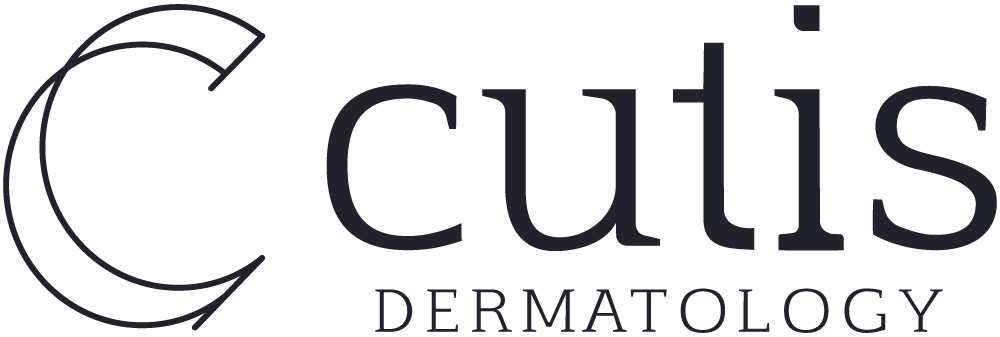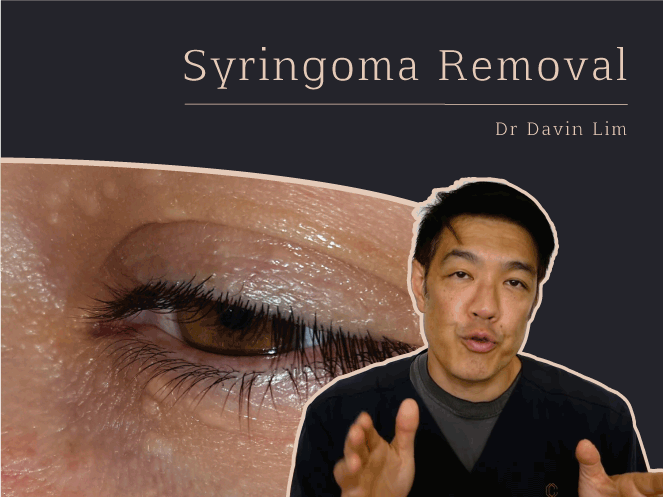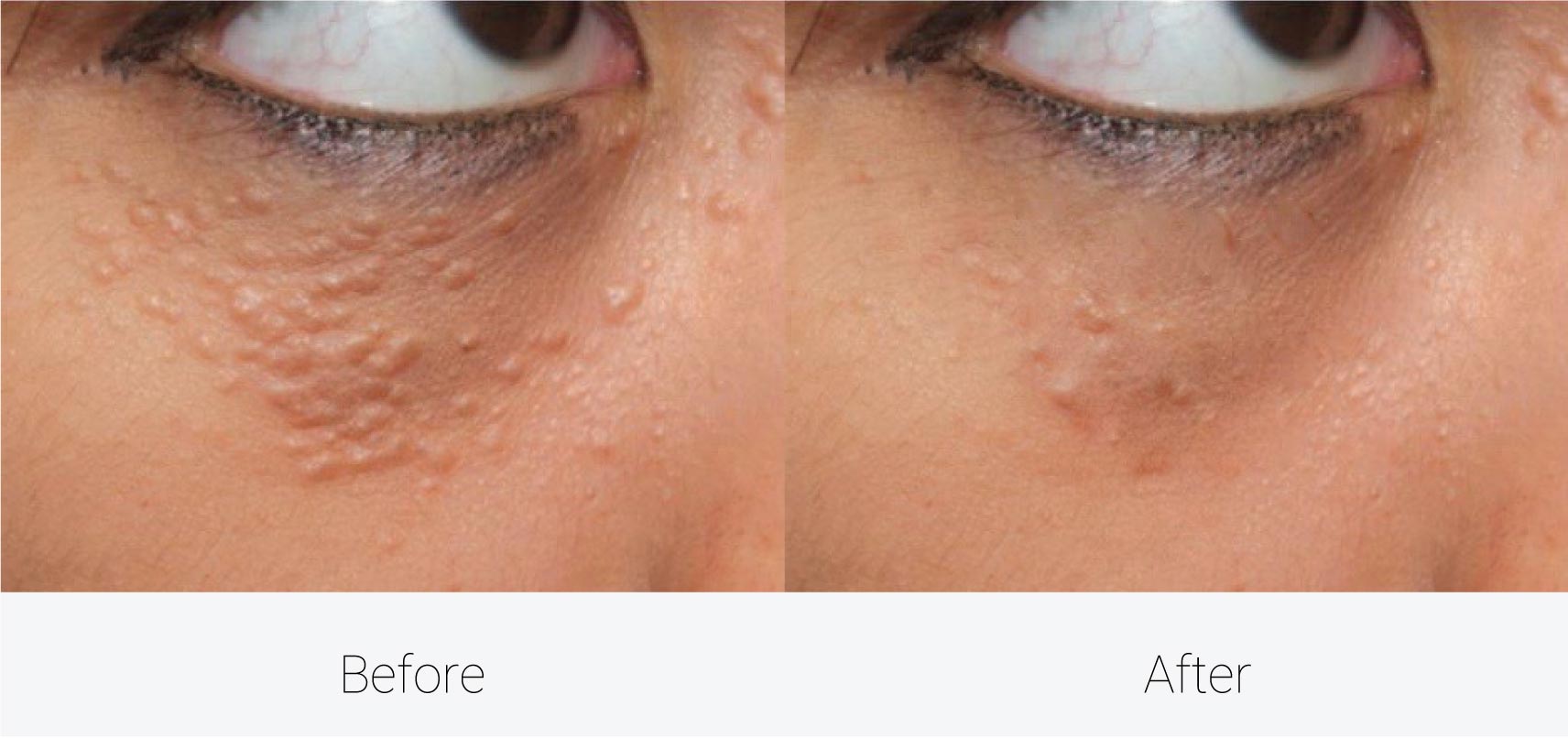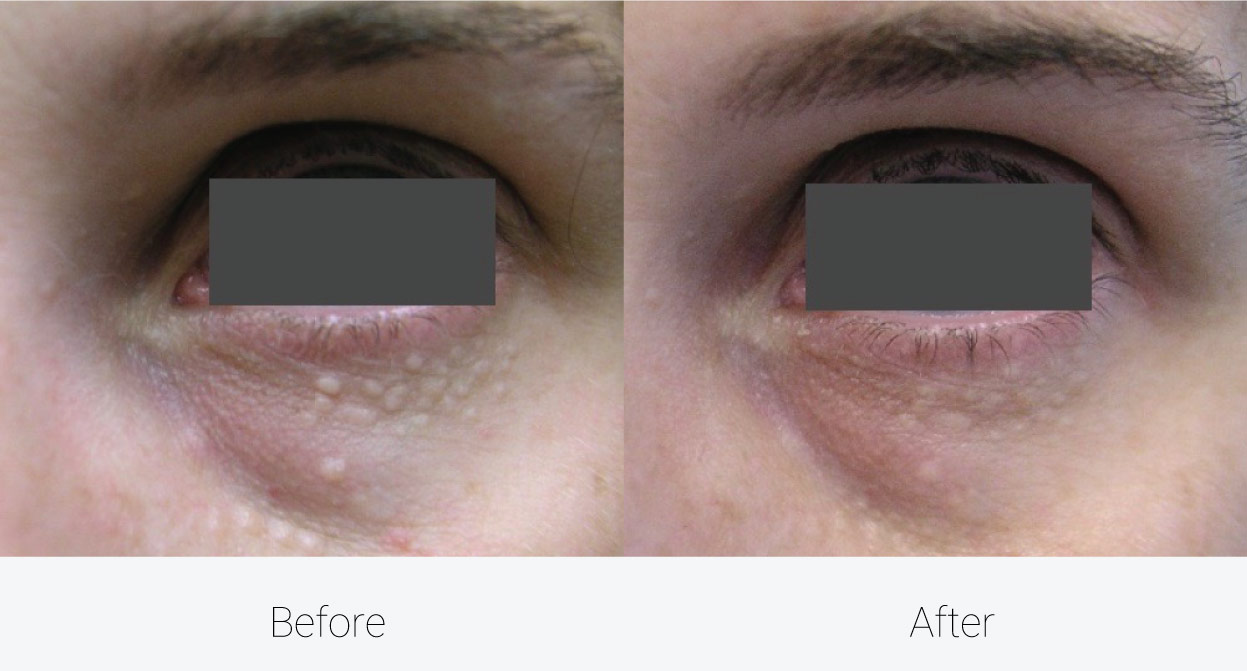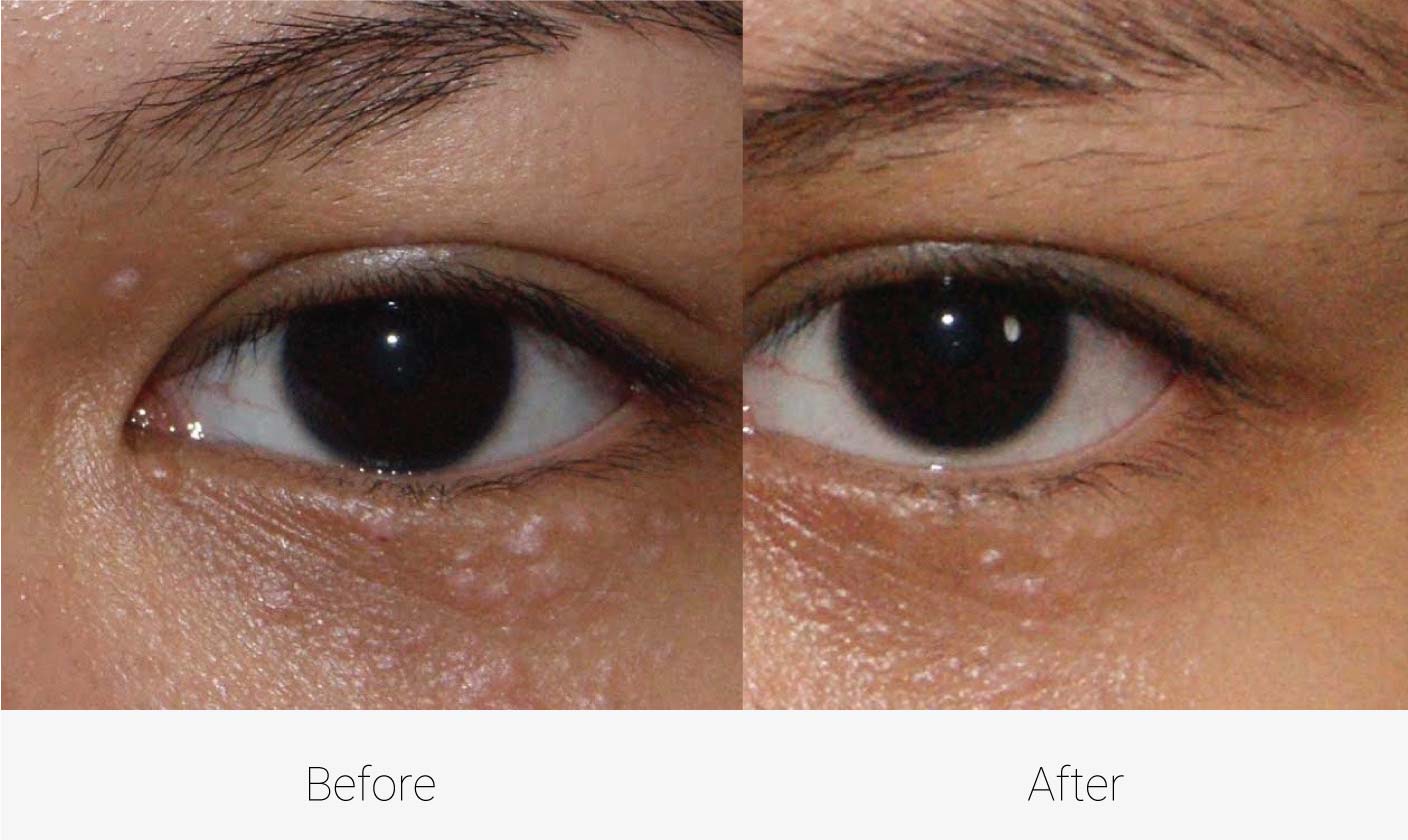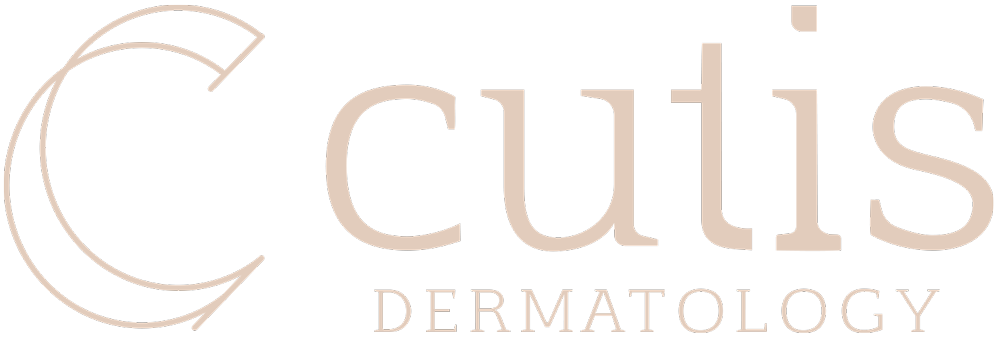Syringomas are common non-cancerous tumours of the skin. Syringomas present as tiny lumps & bumps under the skin, primarily affecting the eye area. They are more common in Asian female patients. Syringomas can be safely & effectively treated with laser resurfacing.
关键点
- Syringomas are common lumps & bumps around the eyes
- They are harmless eccrine or sweat duct tumours
- Syringomas are common in Asian females & occur in the late teens to 20s
- Laser therapy can reduce syringoma spots, dots & lumps
- Recovery from laser takes between 4-8 days
- Laser syringoma treatment is partially Medicare subsidised
Syringoma Removal at a glance
我们的结果不言自明
常见问题
What are syringomas?
Syringomas are common causes of lumps & bumps around the eyes. They are often mistaken for milia; however, the former is much deeper.
The cause of syringomas is genetic, made worse with heat & humidity. They may enlarge over warmer months because they are made of sweat gland units.
How do dermatologists treat syringomas?
We employ ablative lasers to address syringomas. The two main types of lasers we use are-
- CO2 ablative lasers
- Erbium ablative lasers
Lasers work by destroying syringomas using heat. The type of laser we use depends on the number of lesions, your skin colour & the location of your syringomas.
How is laser resurfacing done?
Lasers are performed by our experienced dermatologist. They have nearly 20 years of experience in the treatment of syringomas. The procedure is done in our laser accredited suites at Cutis Dermatology, Brisbane. The procedure goes like this-
- Numbing cream for 60 minutes
- Mild sedation before the procedure, this keeps you relaxed
- Eye protection
- Further numbing solution to the area
- Laser itself- about 10 minutes
- Recovery in our post-laser lounges- 30 minutes
Is treatment painful?
No. We use a combination of topical creams, injections, & mild conscious sedation to ensure your comfort levels. Post procedure there will be no pain.
Will the laser remove all syringomas?
Probably not, aim for a global improvement of 70-95%. The reason for this is that some syringomas lie in deeper muscle layers of skin. If we were to chase these down, the risks of scarring will be too high.
Incomplete removal of syringomas is one of the biggest concerns for patients, however your dermatologist will explain in great detail & length the risk benefit ratio of chasing down deep lesions.
How many treatment sessions will it take to remove syringomas?
Most patients are happy with only one session. Multiple sessions (2-3) maybe required if-
- Syringomas are super deep
- Extensive lesions
- Patients of darker skin types
- Previous history of scarring
- Greater expectations by the patient (more clearance)
What is the recovery from laser resurfacing to syringomas?
4-8 days, depending on the depth of your lesions. As a guide-
Day 3: skin starts to heal
Day 5-6: 90+% of your skin’s surface has reformed
Day 7-8: complete healing
Days 14 -90: possible skin colour changes
Skin hyperpigmentation, known as PIH or post inflammatory hyperpigmentation is an expected outcome of syringoma removal. It is not a compilation. PIH is more severe if you have darker skin, &/or your lesions are deep.
Will laser permanently remove syringomas?
Nope. Remember, this is a genetic condition, hence we cannot modify your DNA. Recurrence is normally seen within 2 to 10 years. You may elect to undergo another laser session at that stage.
What is neuromodulation of syringomas & does it work?
This means anti-wrinkle injections to the areas of syringomas. It works by reducing the activity of eccrine sweat units within the cellular structure of syringomas. This can be effective in reducing the size of syringomas, especially during the hotter months of summer.
We use the Aquagold system if they are widespread, or manual injections if they are focal. anti-wrinkle only lasts 10-20 weeks in this application. It does not remove established lesions, but can marginally reduce the size.
Why is syringoma laser removal one of the most unpredictable laser procedures in dermatology?
Though effective, dermatologists often struggle to convey the pros & cons of laser therapy for syringomas to patients.
Let’s set the stage. We all want ALL the syringomas to go. Completely. Every single one. Dermatologists don’t like to review patients who have remaining syringomas, just like patients don’t want remaining lesions present after surgery. On this basis our goals are aligned. Here are the facts-
- Dermatologists take their time to check, double & triple check that we have got every single possible syringoma during surgery. Time taken during surgery saves time later.
- We push to the maximum safe depth possible. This depends on the depth of your syringoma, the depth of your muscles surrounding your eyes (everyone is different) as well as your skin type – colour.
- In some cases, we must stop lasing because the risks are too high. This means the risk of permanent skin colour changes & or significant lifelong scars.
- We cannot predict which syringomas will remain & what will go. You will be consented for a GLOBAL not a focal improvement. A good aim of global involvement is between 70% to 95%
- Remaining syringomas can be treated at a later stage, however the second laser session may not get them all. In some cases, these lesions may be shallower. If you require a second session, it will be charged accordingly as we cannot guarantee specific syringoma lesions will go.
This consent will be dissed in detail, as there are some patients who cannot understand statements 1 to 5. Remember, we don’t like a job half done, but if you have remaining spots, it is because we don’t want to give you lifelong scars.
产品

O Cosmedics SPF range
$54.00-$64.00
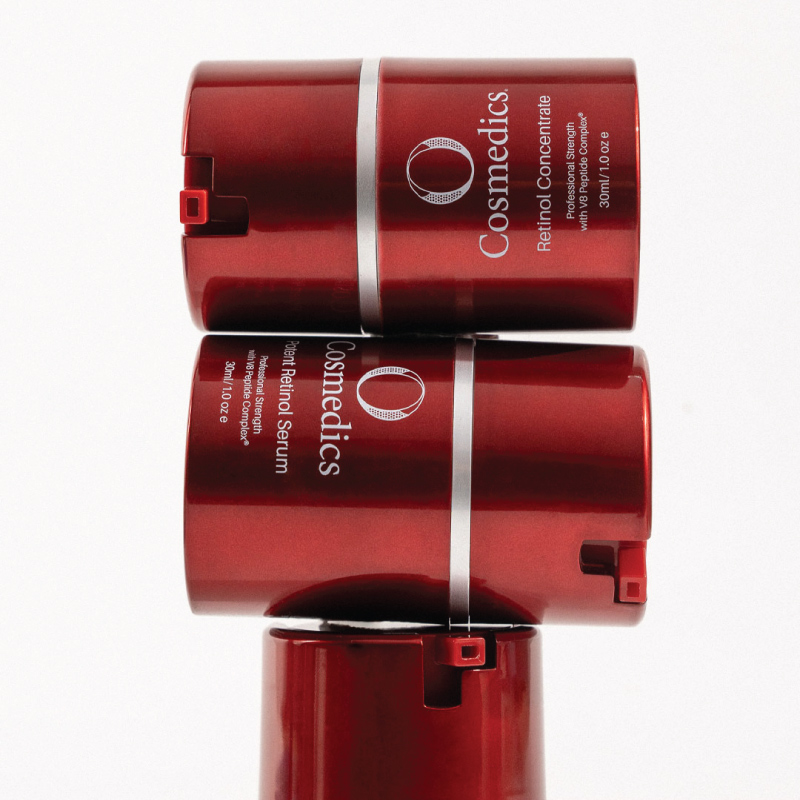
O Cosmedics retinol range
$102.00-$139.00
Our specialists can safely and effectively remove syringomas with laser resurfacing.
What factors govern the aggression of laser therapy & how we treat?
The primary rate limiting factor is pigment.
- If you have a darker skin type, we will be more conservative with therapy. This means you may have to undertake another session.
- If you have melasma, we may not undertake laser therapy as this can flare up melasma. If you can understand that you may require therapy for this potential flare up (not a side effect as it has been identified prior to lasing), we may elect to treat you. If you have poor insight, we will not treat.
If you are nervous about treatment, for example the occurrence of PIH or post inflammatory pigmentation, we may elect not to treat, or treat lighter & follow up with pico lasers. The lighter we treat, the longer it takes to complete the job. You will be counselled accordingly.
How can we speed up pigmentation changes following removal?
Simple measures like sunscreen can reduce your chances of getting prolonged PIH. We also use creams & pico lasers to speed up the healing & reduce the duration of skin darkening.
What are the potential side effects of syringoma removal?
The main side effects we are worried of are-
- Scarring. This occurs when your skin is too reactive to the lasers used to treat syringomas. It can also occur if your physician chases syringomas deeply or widely.
Pigmentation changes, both hypo & hyperpigmentation, permanent (rare).
Can we do test spots to see if the laser is effective & safe?
Yup. In rare cases we undertake test spots. This is mainly for very dark skin types. Your dermatologist will guide you accordingly. Test spots do not represent the entirety of the area affected, however can be useful in some cases.
Can we cut out syringomas?
Yes, if they are very focal (affect a small area). We can either snip excise, or focal excise isolated syringomas. Lasers are preferable as they give less scaring. For super isolated lesions, we also use RF or pin-point diathermy.
What are other things that can look like syringomas?
There are many things that resemble syringomas including milia, adnexal tumours such as trichilemmomas, fibrofolliculomas, trichodiscomas & atypical xanthelasmas. If a diagnosis is uncertain, your dermatologist may take a biopsy.
Can syringomas affect other areas of the body?
Yup, eruptive syringomas can affect facial sites such as the upper lip & neck. They can also be widespread, affecting the chest, abdomen & limbs. Treatment is much as per facial lesions, however in some cases we need to perform laser test spots– especially if you have darker skin type.
治疗费用是多少?
Syringoma removal is partially subsidised by Medicare. The out-of-pocket cost depends on your Medicare threshold & who provides the treatment. As a guide your out-of-pocket costs range between $220 to $1990. This includes theatre costs.
Do creams work?
Nope. Syringomas are under the surface of the skin, hence out of reach of topicals. In the next decade or so we may find a way to get molecules like anti-wrinkle to be active under the skin’s surface without puncturing the skin’s outer layer.
